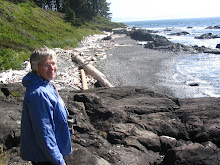 Image via Wikipedia
Image via Wikipedia
However, beneath my reflections on the receptive and productive possibilities with these tools, there is a underlying awareness of the nouns and verbs of our practice. In Will Richardson's blog post of July 12, 2009, Marc Prensky made this comment:
“Verbs” are the skills you, I, Ravich, and everyone else thinks people should know, and learn as students. They include the skills you mention above: to collaborate, to solve problems, to think critically, to be creative, plus many others: e.g. to persuade, to present logically (I list 50 in my new book.) These verbs or skills, as Ravich points out, don’t change very much over time.
“Nouns,” on the other hand, are the tools (aka technolgogies) people use to practice and do these skills. Nouns have always changed over time, e.g. memorizing to writing, papyrus to paper, quills to fountain pens, handwriting to keyboarding. Today nouns are changing extremely rapidly: Powerpoint to Flash, email to IM, Myspace to Facebook to Twitter, encyclopedias to Wikipedia, local disks to cloud, reading to watching short video, laptops to smartphones, etc.
 Image via Wikipedia
Image via Wikipedia
In my view, our goal should be that our learners use, to the extent possible, the best and most up-to-date nouns (tools) to learn and perform each key verb (skill). Older tools often still work for a time (e.g. books), and others work less well (e.g. slide rules). But technology will continue to provide us with better nouns for each of the verbs.
In teaching, our focus needs to be on the verbs, which don’t change very much, and NOT on the nouns (i.e. the technologies) which change rapidly and which are only a means. For teachers to fixate on any particular noun as the “best” way (be it books or blogs, for example) is not good for our students, as new and better nouns will shortly emerge and will continue to emerge over the course of their lifetimes. Our teaching should instead focus on the verbs (i.e. skills)students need to master, making it clear to the students (and to the teachers) that there are many tools learners can use to practice and apply them." (Comment by Marc Prensky)
As I approach this new tool (noun) of wikis, how will I be able to use it to help myself and my students or learning community to develop the important skills (verbs) for life and learning?
References:
Prensky, M. (2009) Comment on The Larger Lessons. Posted July 12, 2009 at http://weblogg-ed.com/2009/the-larger-lessons/
![Reblog this post [with Zemanta]](http://img.zemanta.com/reblog_e.png?x-id=3461d760-08bc-45ec-a15a-3eb3bcb59244)





A word or three about the parts of speech from an English teacher: A) I think it is important to recognize how quickly some of the nouns have "evolved"-- so quickly that edcuators don't appreciate their full potential as tools. In fact the intimidation of newness, change, etc., causes them to dig in and clutch those good old "slide rules." If a teacher doesn't understand the "productive" feature or is not inclined to open up to it, we have a real problem.
ReplyDeleteB) Won't the best jobs and the needs of our societies call for mastery of some of these astonishing tools for collaborating, communicating and accessing information via the Web?
C) In terms of wikis, unanticipated "products" occur when the students take direction of their projects. Also, the acquisition of simple Web skills through Wikis are highly transferable to other forms of social media (and vice versa).
What a great way to document history with getting seniors to tell their stories. Historical stories like this are being told less and less by the older generations, and wikis would be a great way to create a collaborative history of a community.
ReplyDeleteA really interesting blog and some interesting comments too.
ReplyDeleteThanks Larry, Gerta, and Jennifer,
ReplyDeleteTwo minutes ago I was alerted on my email account that someone (anonymous) had posted information to the Caswell Homes wiki that I had set up. It was my Mom who had added more information to the streetcar page. Yesterday she was typing away very quickly on the little laptop keyboard at our family birthday party. One of her grandchildren said, "You're so fast, Grandma." She said, "Well, I made my living for 30 years using a keyboard." Her tools changed from manual typewriter to electric typewriter to word processing and now to home computer. And yet, she can adapt to use these new tools to help preserve history and tell local stories and communicate (the verbs). Way to go, Mom. I hope I can adjust to the new tools as well as she has.
Extremely helpful post. This is my first time i visit here. I discovered such a large number of intriguing stuff in your blog particularly its exchange. Truly its extraordinary article. Keep it up. Toolbox Wiki
ReplyDeleteYour post has those certainties which are not open from anyplace else. It's my unassuming solicitation to u please continue composing such astounding articles whatsapp hackers for hire
ReplyDeleteSnapchat Hackers for Hire are now available to restore deleted Snapchat Accounts, Hacked Snapchat Accounts, Lost or Forgotten Passwords and Monitoring of Accounts that belong to spouses, children or employees. professional hackers
ReplyDelete